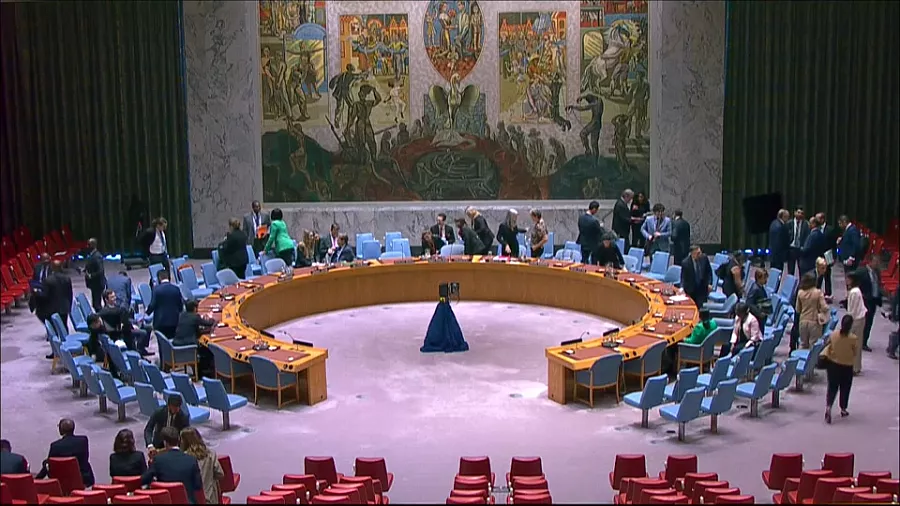UN extends Western Sahara mission amidst abstentions and Algerian protest
3 min read
On October 31, the United Nations Security Council voted to extend the mandate of the UN Mission for the Referendum in Western Sahara (MINURSO) for another year. However, the decision was overshadowed by abstentions from both Russia and Mozambique, and Algeria chose not to vote at all, highlighting ongoing tensions surrounding the issue.
Algeria had proposed two amendments aimed at bolstering a political solution to the long-standing dispute over Western Sahara, but these amendments were ultimately rejected. U.S. representative Robert A. Wood, whose country spearheaded the resolution, reaffirmed the Council’s commitment to supporting the efforts of the Personal Envoy tasked with finding “an enduring and dignified resolution for Western Sahara.”
The response from Algeria was critical. Ambassador Amar Bendjama, Algeria’s Permanent Representative to the UN, expressed his discontent with the decision-making process. He stated, “Over the last week, our views, which I meticulously documented and substantiated with agreed language within the Security Council, were not taken into account… they were deliberately ignored.” This comment reflects Algeria’s frustration and the complexities of negotiating a resolution to the Western Sahara situation.
Algeria’s abstention was a direct response to what it viewed as a lack of consideration for its proposed amendments, which aimed to enhance support for a peaceful resolution. The country has been a vocal advocate for the rights of the Sahrawi people and has consistently pushed for a solution that acknowledges their self-determination.
Echoing similar sentiments, Mozambique’s UN Ambassador Pedro Comissário articulated concerns regarding the resolution’s current form. He remarked, “The resolution, without the Algerian amendments, will not assist the parties in achieving a just, lasting, and mutually acceptable political solution.” This perspective emphasizes the broader regional concerns about the resolution’s potential effectiveness in fostering dialogue and reconciliation among the conflicting parties.
Russia’s position was equally critical. Ambassador Vasily Nebenzya expressed his reservations about the resolution, stating that it “does not reflect a real situation on the ground.” He argued that the resolution is unlikely to promote a mutually acceptable resolution, highlighting that Russia’s own recommendations aimed at revitalizing stagnant peace efforts were ignored in the discussions.
The situation in Western Sahara has been contentious since the withdrawal of Spanish colonial forces in 1975, which led to a conflict between Morocco, which claims the territory, and the Sahrawi Arab Democratic Republic, declared by the Polisario Front, which seeks independence for the region. MINURSO was established to oversee a referendum for the self-determination of the Sahrawi people, but the vote has been delayed for decades, contributing to ongoing tensions in the region.
The UN’s mandate renewal comes amid concerns that the status quo is neither sustainable nor conducive to peace. Analysts warn that the continued lack of progress could exacerbate regional instability and complicate relationships among involved parties, including Morocco, Algeria, and the Sahrawi people.
The abstentions from Russia and Mozambique, as well as Algeria’s decision to abstain from the vote, reflect deeper geopolitical divides and varying perspectives on how best to address the Western Sahara conflict. The lack of consensus highlights the challenges the UN faces in mediating this protracted dispute.
As the situation develops, the effectiveness of MINURSO in facilitating dialogue and promoting a political solution remains in question. The need for a comprehensive approach that considers the interests of all stakeholders is critical if lasting peace is to be achieved in Western Sahara.
The extension of MINURSO’s mandate serves as a reminder of the complexity surrounding the issue and the necessity for ongoing international engagement. It underscores the importance of listening to the voices of all parties involved and striving for a resolution that respects the rights and aspirations of the Sahrawi people while also addressing the concerns of neighboring states.
In summary, the recent UN Security Council vote to extend the Western Sahara mission underscores significant divisions among member states regarding the approach to resolving the conflict. The criticisms from Algeria, Mozambique, and Russia point to a complex landscape where achieving a consensus remains a formidable challenge. As stakeholders continue to navigate this sensitive issue, the hope remains for a breakthrough that brings about a just and lasting resolution for the people of Western Sahara.







